Organizational Behavior: Managing Employee Challenges & Solutions
VerifiedAdded on 2023/06/12
|10
|2506
|68
Essay
AI Summary
This essay explores the multifaceted challenges managers face in effectively managing employee behavior within dynamic organizational settings. It identifies key issues such as workforce diversity, ethical behavior, the need for continuous skill improvement, stimulating innovation, navigating globalization, and optimizing performance management. The essay delves into how these challenges impact teamwork, organizational ethics, and the ability to adapt to global market demands. Furthermore, it proposes five practical solutions, including strategic selection and screening processes, tailored management approaches to accommodate workforce diversity, cross-cultural training programs, the establishment of comprehensive ethical codes, and the cultivation of an innovative organizational culture through incentivization. The paper concludes by emphasizing the importance of addressing these challenges to foster a productive and ethical work environment.
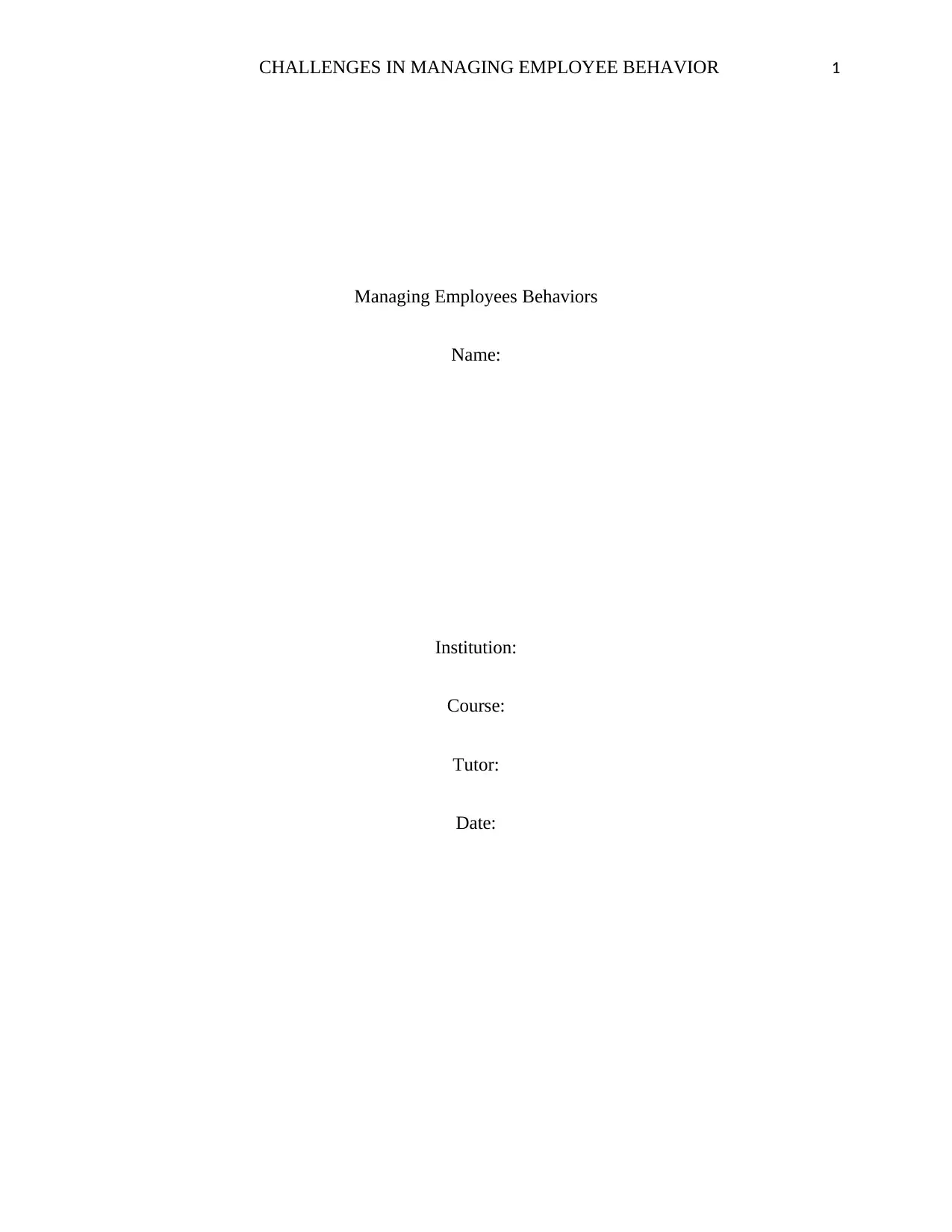
CHALLENGES IN MANAGING EMPLOYEE BEHAVIOR 1
Managing Employees Behaviors
Name:
Institution:
Course:
Tutor:
Date:
Managing Employees Behaviors
Name:
Institution:
Course:
Tutor:
Date:
Paraphrase This Document
Need a fresh take? Get an instant paraphrase of this document with our AI Paraphraser
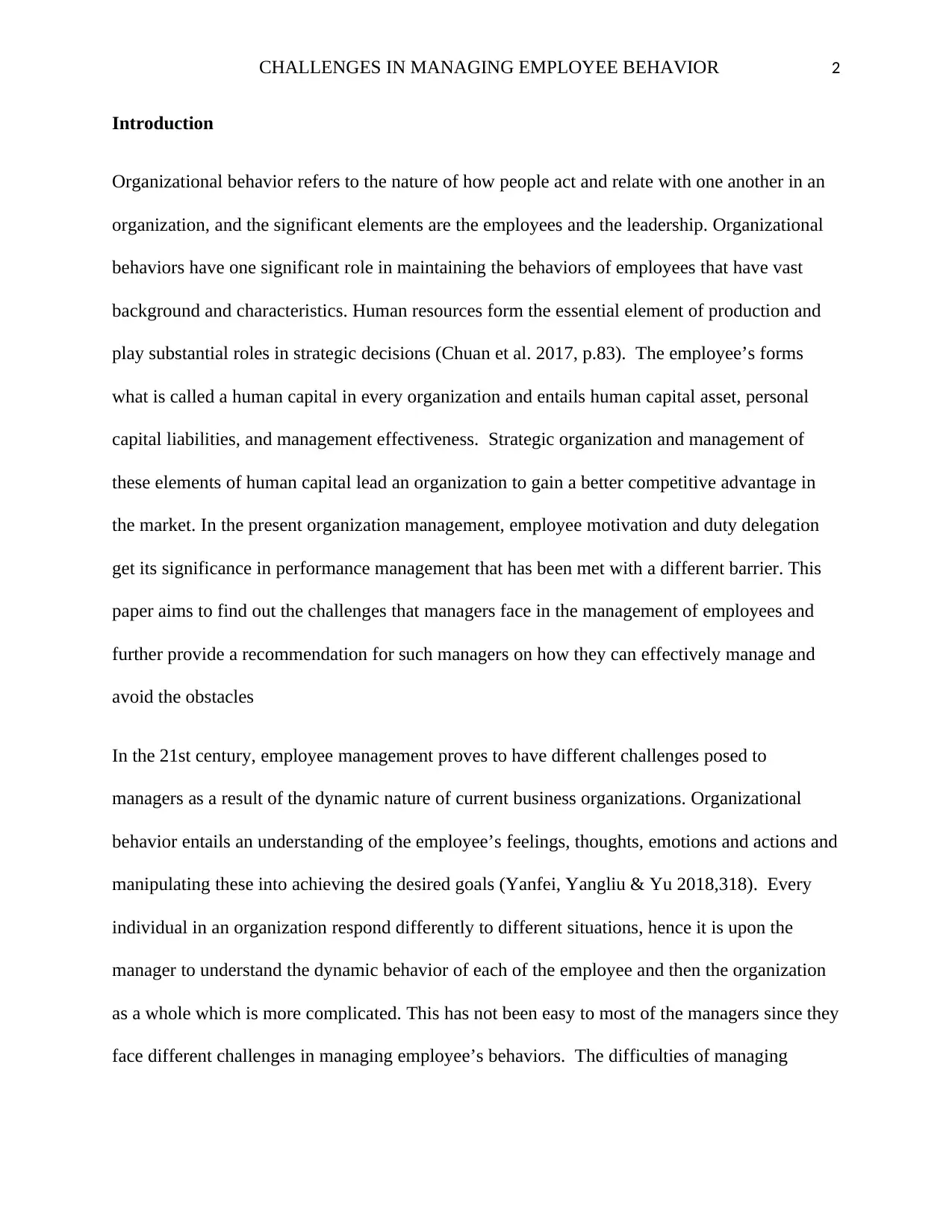
CHALLENGES IN MANAGING EMPLOYEE BEHAVIOR 2
Introduction
Organizational behavior refers to the nature of how people act and relate with one another in an
organization, and the significant elements are the employees and the leadership. Organizational
behaviors have one significant role in maintaining the behaviors of employees that have vast
background and characteristics. Human resources form the essential element of production and
play substantial roles in strategic decisions (Chuan et al. 2017, p.83). The employee’s forms
what is called a human capital in every organization and entails human capital asset, personal
capital liabilities, and management effectiveness. Strategic organization and management of
these elements of human capital lead an organization to gain a better competitive advantage in
the market. In the present organization management, employee motivation and duty delegation
get its significance in performance management that has been met with a different barrier. This
paper aims to find out the challenges that managers face in the management of employees and
further provide a recommendation for such managers on how they can effectively manage and
avoid the obstacles
In the 21st century, employee management proves to have different challenges posed to
managers as a result of the dynamic nature of current business organizations. Organizational
behavior entails an understanding of the employee’s feelings, thoughts, emotions and actions and
manipulating these into achieving the desired goals (Yanfei, Yangliu & Yu 2018,318). Every
individual in an organization respond differently to different situations, hence it is upon the
manager to understand the dynamic behavior of each of the employee and then the organization
as a whole which is more complicated. This has not been easy to most of the managers since they
face different challenges in managing employee’s behaviors. The difficulties of managing
Introduction
Organizational behavior refers to the nature of how people act and relate with one another in an
organization, and the significant elements are the employees and the leadership. Organizational
behaviors have one significant role in maintaining the behaviors of employees that have vast
background and characteristics. Human resources form the essential element of production and
play substantial roles in strategic decisions (Chuan et al. 2017, p.83). The employee’s forms
what is called a human capital in every organization and entails human capital asset, personal
capital liabilities, and management effectiveness. Strategic organization and management of
these elements of human capital lead an organization to gain a better competitive advantage in
the market. In the present organization management, employee motivation and duty delegation
get its significance in performance management that has been met with a different barrier. This
paper aims to find out the challenges that managers face in the management of employees and
further provide a recommendation for such managers on how they can effectively manage and
avoid the obstacles
In the 21st century, employee management proves to have different challenges posed to
managers as a result of the dynamic nature of current business organizations. Organizational
behavior entails an understanding of the employee’s feelings, thoughts, emotions and actions and
manipulating these into achieving the desired goals (Yanfei, Yangliu & Yu 2018,318). Every
individual in an organization respond differently to different situations, hence it is upon the
manager to understand the dynamic behavior of each of the employee and then the organization
as a whole which is more complicated. This has not been easy to most of the managers since they
face different challenges in managing employee’s behaviors. The difficulties of managing
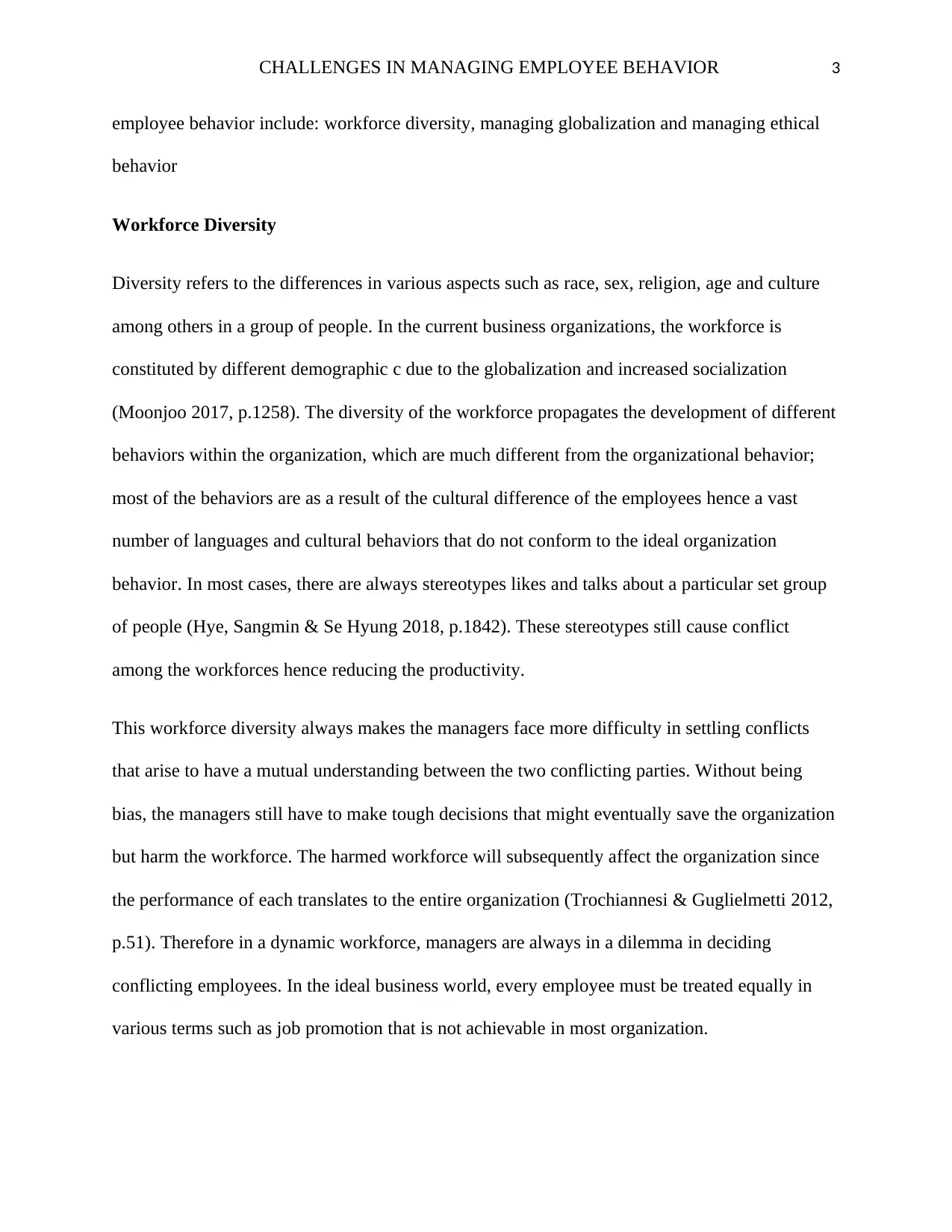
CHALLENGES IN MANAGING EMPLOYEE BEHAVIOR 3
employee behavior include: workforce diversity, managing globalization and managing ethical
behavior
Workforce Diversity
Diversity refers to the differences in various aspects such as race, sex, religion, age and culture
among others in a group of people. In the current business organizations, the workforce is
constituted by different demographic c due to the globalization and increased socialization
(Moonjoo 2017, p.1258). The diversity of the workforce propagates the development of different
behaviors within the organization, which are much different from the organizational behavior;
most of the behaviors are as a result of the cultural difference of the employees hence a vast
number of languages and cultural behaviors that do not conform to the ideal organization
behavior. In most cases, there are always stereotypes likes and talks about a particular set group
of people (Hye, Sangmin & Se Hyung 2018, p.1842). These stereotypes still cause conflict
among the workforces hence reducing the productivity.
This workforce diversity always makes the managers face more difficulty in settling conflicts
that arise to have a mutual understanding between the two conflicting parties. Without being
bias, the managers still have to make tough decisions that might eventually save the organization
but harm the workforce. The harmed workforce will subsequently affect the organization since
the performance of each translates to the entire organization (Trochiannesi & Guglielmetti 2012,
p.51). Therefore in a dynamic workforce, managers are always in a dilemma in deciding
conflicting employees. In the ideal business world, every employee must be treated equally in
various terms such as job promotion that is not achievable in most organization.
employee behavior include: workforce diversity, managing globalization and managing ethical
behavior
Workforce Diversity
Diversity refers to the differences in various aspects such as race, sex, religion, age and culture
among others in a group of people. In the current business organizations, the workforce is
constituted by different demographic c due to the globalization and increased socialization
(Moonjoo 2017, p.1258). The diversity of the workforce propagates the development of different
behaviors within the organization, which are much different from the organizational behavior;
most of the behaviors are as a result of the cultural difference of the employees hence a vast
number of languages and cultural behaviors that do not conform to the ideal organization
behavior. In most cases, there are always stereotypes likes and talks about a particular set group
of people (Hye, Sangmin & Se Hyung 2018, p.1842). These stereotypes still cause conflict
among the workforces hence reducing the productivity.
This workforce diversity always makes the managers face more difficulty in settling conflicts
that arise to have a mutual understanding between the two conflicting parties. Without being
bias, the managers still have to make tough decisions that might eventually save the organization
but harm the workforce. The harmed workforce will subsequently affect the organization since
the performance of each translates to the entire organization (Trochiannesi & Guglielmetti 2012,
p.51). Therefore in a dynamic workforce, managers are always in a dilemma in deciding
conflicting employees. In the ideal business world, every employee must be treated equally in
various terms such as job promotion that is not achievable in most organization.
⊘ This is a preview!⊘
Do you want full access?
Subscribe today to unlock all pages.

Trusted by 1+ million students worldwide
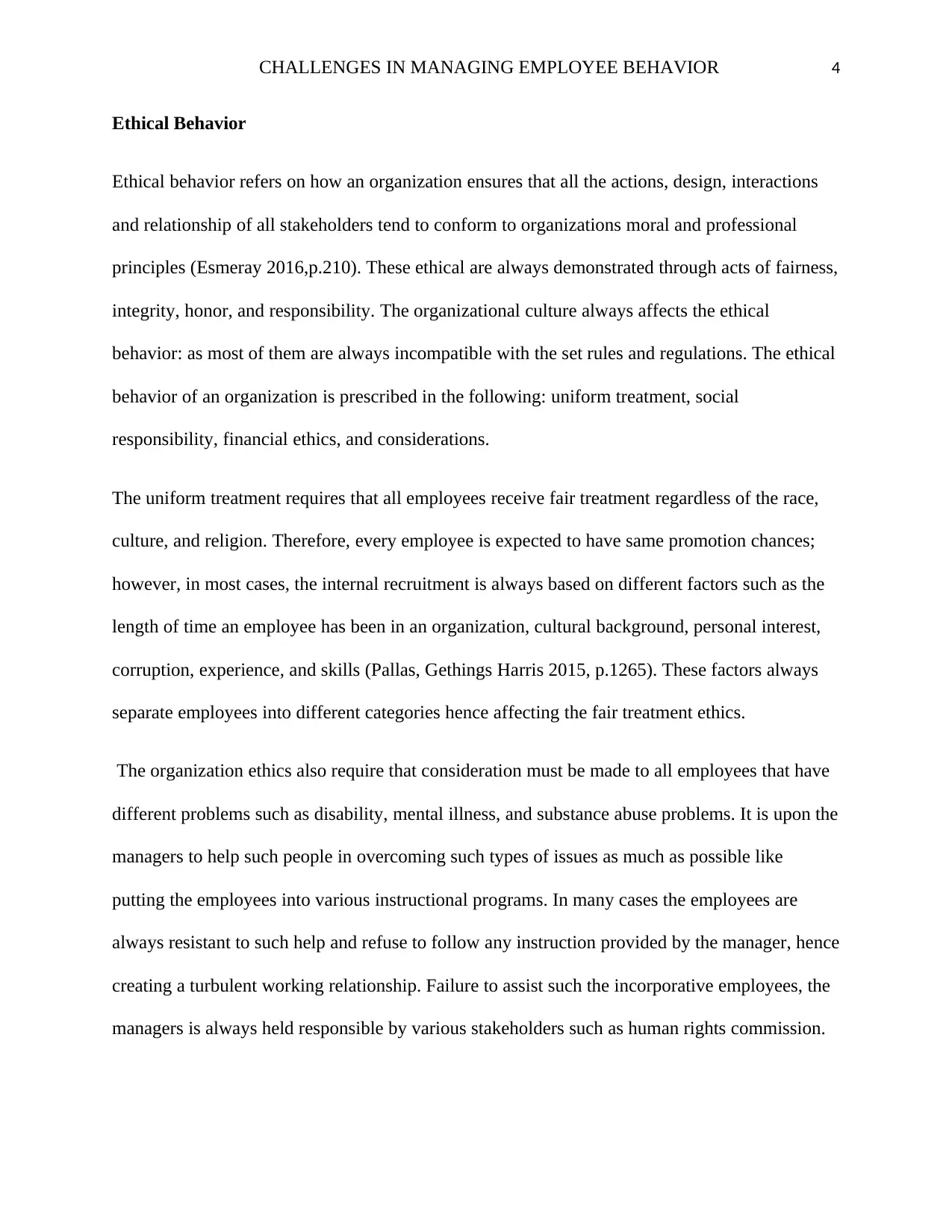
CHALLENGES IN MANAGING EMPLOYEE BEHAVIOR 4
Ethical Behavior
Ethical behavior refers on how an organization ensures that all the actions, design, interactions
and relationship of all stakeholders tend to conform to organizations moral and professional
principles (Esmeray 2016,p.210). These ethical are always demonstrated through acts of fairness,
integrity, honor, and responsibility. The organizational culture always affects the ethical
behavior: as most of them are always incompatible with the set rules and regulations. The ethical
behavior of an organization is prescribed in the following: uniform treatment, social
responsibility, financial ethics, and considerations.
The uniform treatment requires that all employees receive fair treatment regardless of the race,
culture, and religion. Therefore, every employee is expected to have same promotion chances;
however, in most cases, the internal recruitment is always based on different factors such as the
length of time an employee has been in an organization, cultural background, personal interest,
corruption, experience, and skills (Pallas, Gethings Harris 2015, p.1265). These factors always
separate employees into different categories hence affecting the fair treatment ethics.
The organization ethics also require that consideration must be made to all employees that have
different problems such as disability, mental illness, and substance abuse problems. It is upon the
managers to help such people in overcoming such types of issues as much as possible like
putting the employees into various instructional programs. In many cases the employees are
always resistant to such help and refuse to follow any instruction provided by the manager, hence
creating a turbulent working relationship. Failure to assist such the incorporative employees, the
managers is always held responsible by various stakeholders such as human rights commission.
Ethical Behavior
Ethical behavior refers on how an organization ensures that all the actions, design, interactions
and relationship of all stakeholders tend to conform to organizations moral and professional
principles (Esmeray 2016,p.210). These ethical are always demonstrated through acts of fairness,
integrity, honor, and responsibility. The organizational culture always affects the ethical
behavior: as most of them are always incompatible with the set rules and regulations. The ethical
behavior of an organization is prescribed in the following: uniform treatment, social
responsibility, financial ethics, and considerations.
The uniform treatment requires that all employees receive fair treatment regardless of the race,
culture, and religion. Therefore, every employee is expected to have same promotion chances;
however, in most cases, the internal recruitment is always based on different factors such as the
length of time an employee has been in an organization, cultural background, personal interest,
corruption, experience, and skills (Pallas, Gethings Harris 2015, p.1265). These factors always
separate employees into different categories hence affecting the fair treatment ethics.
The organization ethics also require that consideration must be made to all employees that have
different problems such as disability, mental illness, and substance abuse problems. It is upon the
managers to help such people in overcoming such types of issues as much as possible like
putting the employees into various instructional programs. In many cases the employees are
always resistant to such help and refuse to follow any instruction provided by the manager, hence
creating a turbulent working relationship. Failure to assist such the incorporative employees, the
managers is always held responsible by various stakeholders such as human rights commission.
Paraphrase This Document
Need a fresh take? Get an instant paraphrase of this document with our AI Paraphraser
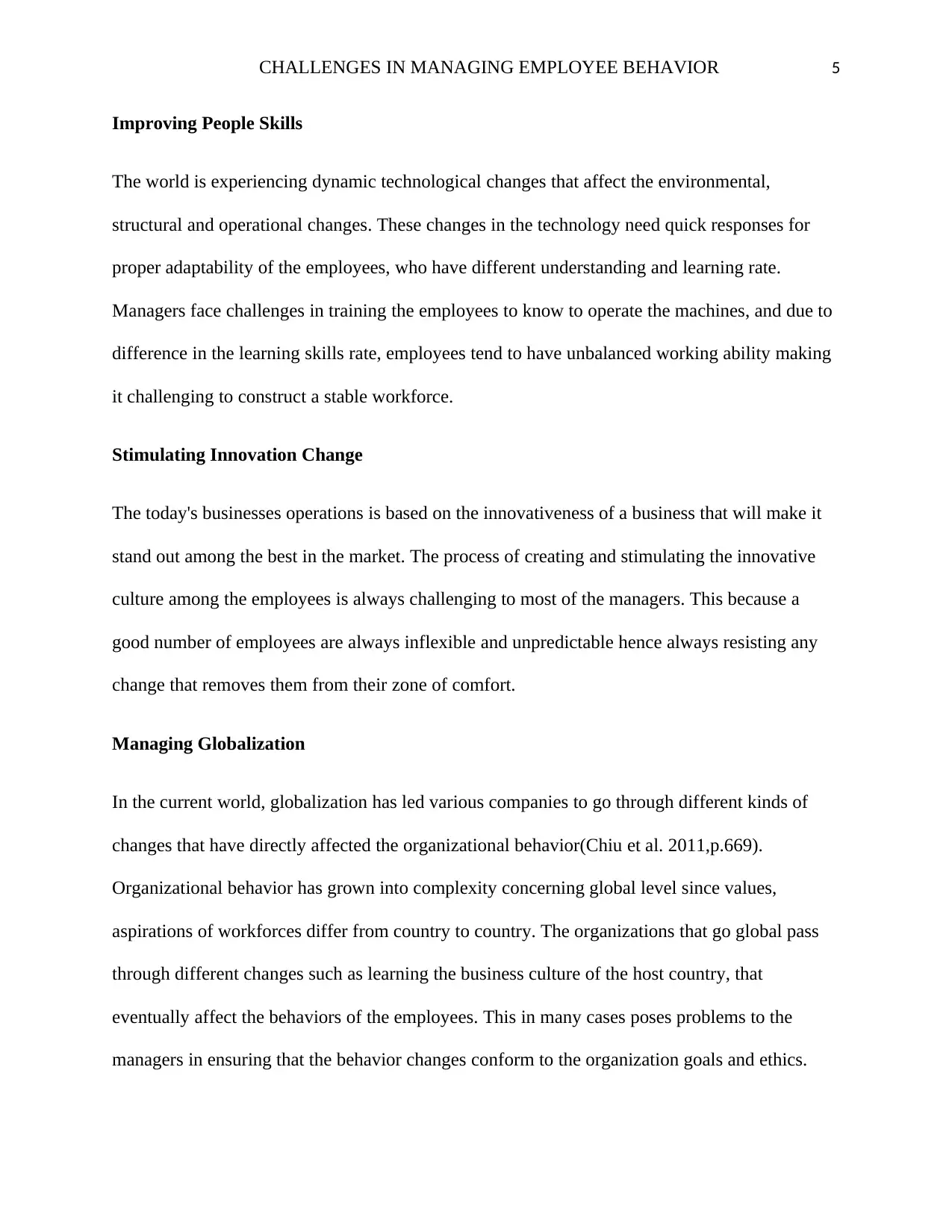
CHALLENGES IN MANAGING EMPLOYEE BEHAVIOR 5
Improving People Skills
The world is experiencing dynamic technological changes that affect the environmental,
structural and operational changes. These changes in the technology need quick responses for
proper adaptability of the employees, who have different understanding and learning rate.
Managers face challenges in training the employees to know to operate the machines, and due to
difference in the learning skills rate, employees tend to have unbalanced working ability making
it challenging to construct a stable workforce.
Stimulating Innovation Change
The today's businesses operations is based on the innovativeness of a business that will make it
stand out among the best in the market. The process of creating and stimulating the innovative
culture among the employees is always challenging to most of the managers. This because a
good number of employees are always inflexible and unpredictable hence always resisting any
change that removes them from their zone of comfort.
Managing Globalization
In the current world, globalization has led various companies to go through different kinds of
changes that have directly affected the organizational behavior(Chiu et al. 2011,p.669).
Organizational behavior has grown into complexity concerning global level since values,
aspirations of workforces differ from country to country. The organizations that go global pass
through different changes such as learning the business culture of the host country, that
eventually affect the behaviors of the employees. This in many cases poses problems to the
managers in ensuring that the behavior changes conform to the organization goals and ethics.
Improving People Skills
The world is experiencing dynamic technological changes that affect the environmental,
structural and operational changes. These changes in the technology need quick responses for
proper adaptability of the employees, who have different understanding and learning rate.
Managers face challenges in training the employees to know to operate the machines, and due to
difference in the learning skills rate, employees tend to have unbalanced working ability making
it challenging to construct a stable workforce.
Stimulating Innovation Change
The today's businesses operations is based on the innovativeness of a business that will make it
stand out among the best in the market. The process of creating and stimulating the innovative
culture among the employees is always challenging to most of the managers. This because a
good number of employees are always inflexible and unpredictable hence always resisting any
change that removes them from their zone of comfort.
Managing Globalization
In the current world, globalization has led various companies to go through different kinds of
changes that have directly affected the organizational behavior(Chiu et al. 2011,p.669).
Organizational behavior has grown into complexity concerning global level since values,
aspirations of workforces differ from country to country. The organizations that go global pass
through different changes such as learning the business culture of the host country, that
eventually affect the behaviors of the employees. This in many cases poses problems to the
managers in ensuring that the behavior changes conform to the organization goals and ethics.
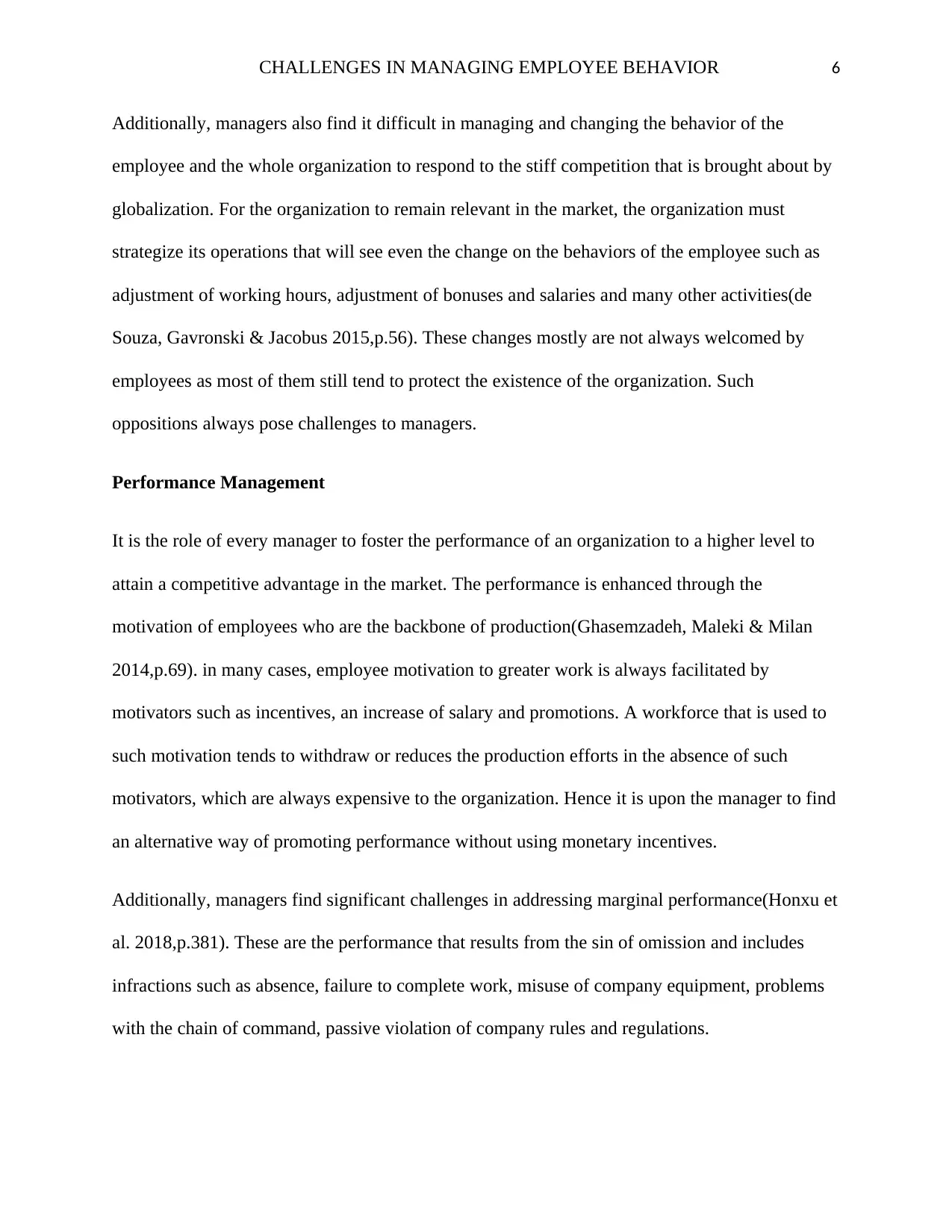
CHALLENGES IN MANAGING EMPLOYEE BEHAVIOR 6
Additionally, managers also find it difficult in managing and changing the behavior of the
employee and the whole organization to respond to the stiff competition that is brought about by
globalization. For the organization to remain relevant in the market, the organization must
strategize its operations that will see even the change on the behaviors of the employee such as
adjustment of working hours, adjustment of bonuses and salaries and many other activities(de
Souza, Gavronski & Jacobus 2015,p.56). These changes mostly are not always welcomed by
employees as most of them still tend to protect the existence of the organization. Such
oppositions always pose challenges to managers.
Performance Management
It is the role of every manager to foster the performance of an organization to a higher level to
attain a competitive advantage in the market. The performance is enhanced through the
motivation of employees who are the backbone of production(Ghasemzadeh, Maleki & Milan
2014,p.69). in many cases, employee motivation to greater work is always facilitated by
motivators such as incentives, an increase of salary and promotions. A workforce that is used to
such motivation tends to withdraw or reduces the production efforts in the absence of such
motivators, which are always expensive to the organization. Hence it is upon the manager to find
an alternative way of promoting performance without using monetary incentives.
Additionally, managers find significant challenges in addressing marginal performance(Honxu et
al. 2018,p.381). These are the performance that results from the sin of omission and includes
infractions such as absence, failure to complete work, misuse of company equipment, problems
with the chain of command, passive violation of company rules and regulations.
Additionally, managers also find it difficult in managing and changing the behavior of the
employee and the whole organization to respond to the stiff competition that is brought about by
globalization. For the organization to remain relevant in the market, the organization must
strategize its operations that will see even the change on the behaviors of the employee such as
adjustment of working hours, adjustment of bonuses and salaries and many other activities(de
Souza, Gavronski & Jacobus 2015,p.56). These changes mostly are not always welcomed by
employees as most of them still tend to protect the existence of the organization. Such
oppositions always pose challenges to managers.
Performance Management
It is the role of every manager to foster the performance of an organization to a higher level to
attain a competitive advantage in the market. The performance is enhanced through the
motivation of employees who are the backbone of production(Ghasemzadeh, Maleki & Milan
2014,p.69). in many cases, employee motivation to greater work is always facilitated by
motivators such as incentives, an increase of salary and promotions. A workforce that is used to
such motivation tends to withdraw or reduces the production efforts in the absence of such
motivators, which are always expensive to the organization. Hence it is upon the manager to find
an alternative way of promoting performance without using monetary incentives.
Additionally, managers find significant challenges in addressing marginal performance(Honxu et
al. 2018,p.381). These are the performance that results from the sin of omission and includes
infractions such as absence, failure to complete work, misuse of company equipment, problems
with the chain of command, passive violation of company rules and regulations.
⊘ This is a preview!⊘
Do you want full access?
Subscribe today to unlock all pages.

Trusted by 1+ million students worldwide
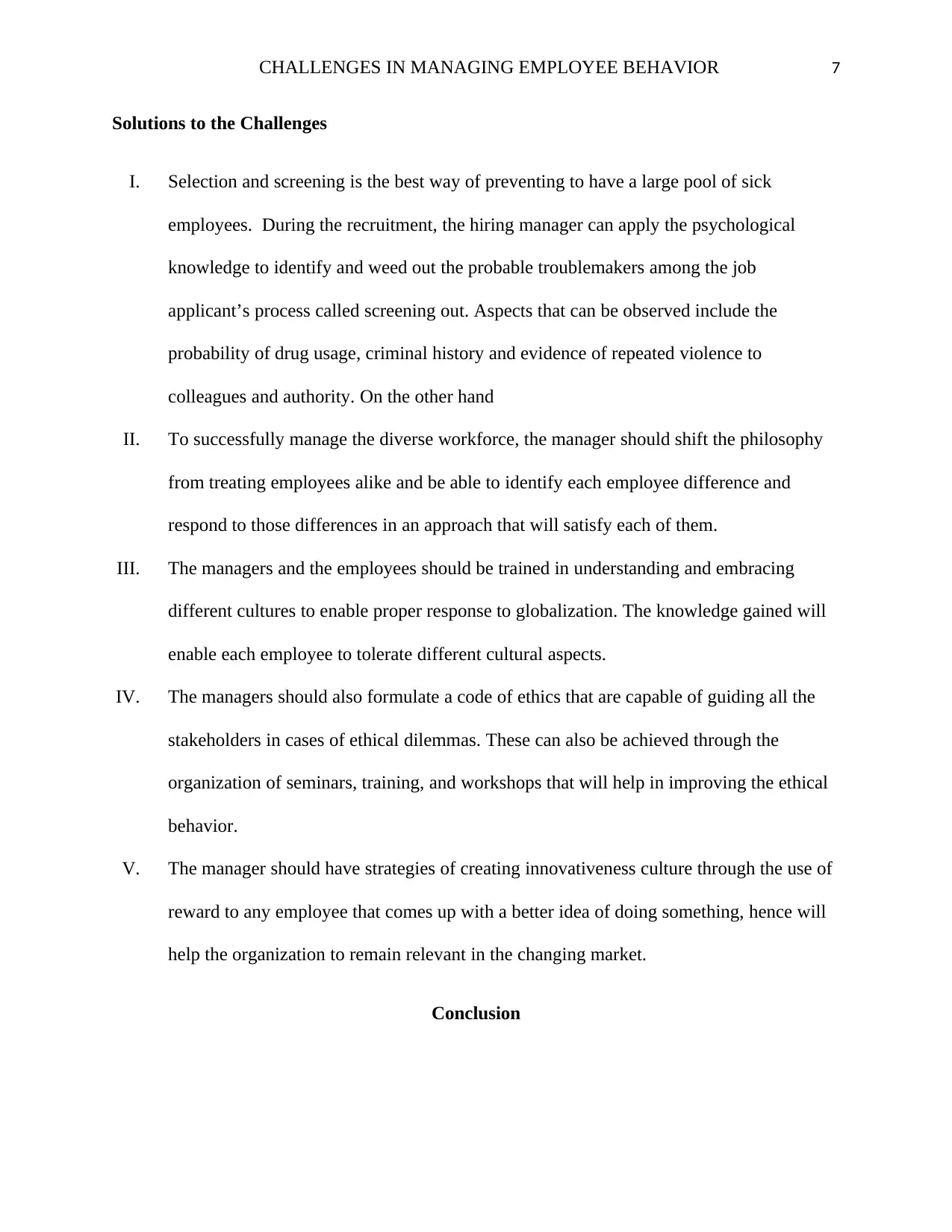
CHALLENGES IN MANAGING EMPLOYEE BEHAVIOR 7
Solutions to the Challenges
I. Selection and screening is the best way of preventing to have a large pool of sick
employees. During the recruitment, the hiring manager can apply the psychological
knowledge to identify and weed out the probable troublemakers among the job
applicant’s process called screening out. Aspects that can be observed include the
probability of drug usage, criminal history and evidence of repeated violence to
colleagues and authority. On the other hand
II. To successfully manage the diverse workforce, the manager should shift the philosophy
from treating employees alike and be able to identify each employee difference and
respond to those differences in an approach that will satisfy each of them.
III. The managers and the employees should be trained in understanding and embracing
different cultures to enable proper response to globalization. The knowledge gained will
enable each employee to tolerate different cultural aspects.
IV. The managers should also formulate a code of ethics that are capable of guiding all the
stakeholders in cases of ethical dilemmas. These can also be achieved through the
organization of seminars, training, and workshops that will help in improving the ethical
behavior.
V. The manager should have strategies of creating innovativeness culture through the use of
reward to any employee that comes up with a better idea of doing something, hence will
help the organization to remain relevant in the changing market.
Conclusion
Solutions to the Challenges
I. Selection and screening is the best way of preventing to have a large pool of sick
employees. During the recruitment, the hiring manager can apply the psychological
knowledge to identify and weed out the probable troublemakers among the job
applicant’s process called screening out. Aspects that can be observed include the
probability of drug usage, criminal history and evidence of repeated violence to
colleagues and authority. On the other hand
II. To successfully manage the diverse workforce, the manager should shift the philosophy
from treating employees alike and be able to identify each employee difference and
respond to those differences in an approach that will satisfy each of them.
III. The managers and the employees should be trained in understanding and embracing
different cultures to enable proper response to globalization. The knowledge gained will
enable each employee to tolerate different cultural aspects.
IV. The managers should also formulate a code of ethics that are capable of guiding all the
stakeholders in cases of ethical dilemmas. These can also be achieved through the
organization of seminars, training, and workshops that will help in improving the ethical
behavior.
V. The manager should have strategies of creating innovativeness culture through the use of
reward to any employee that comes up with a better idea of doing something, hence will
help the organization to remain relevant in the changing market.
Conclusion
Paraphrase This Document
Need a fresh take? Get an instant paraphrase of this document with our AI Paraphraser
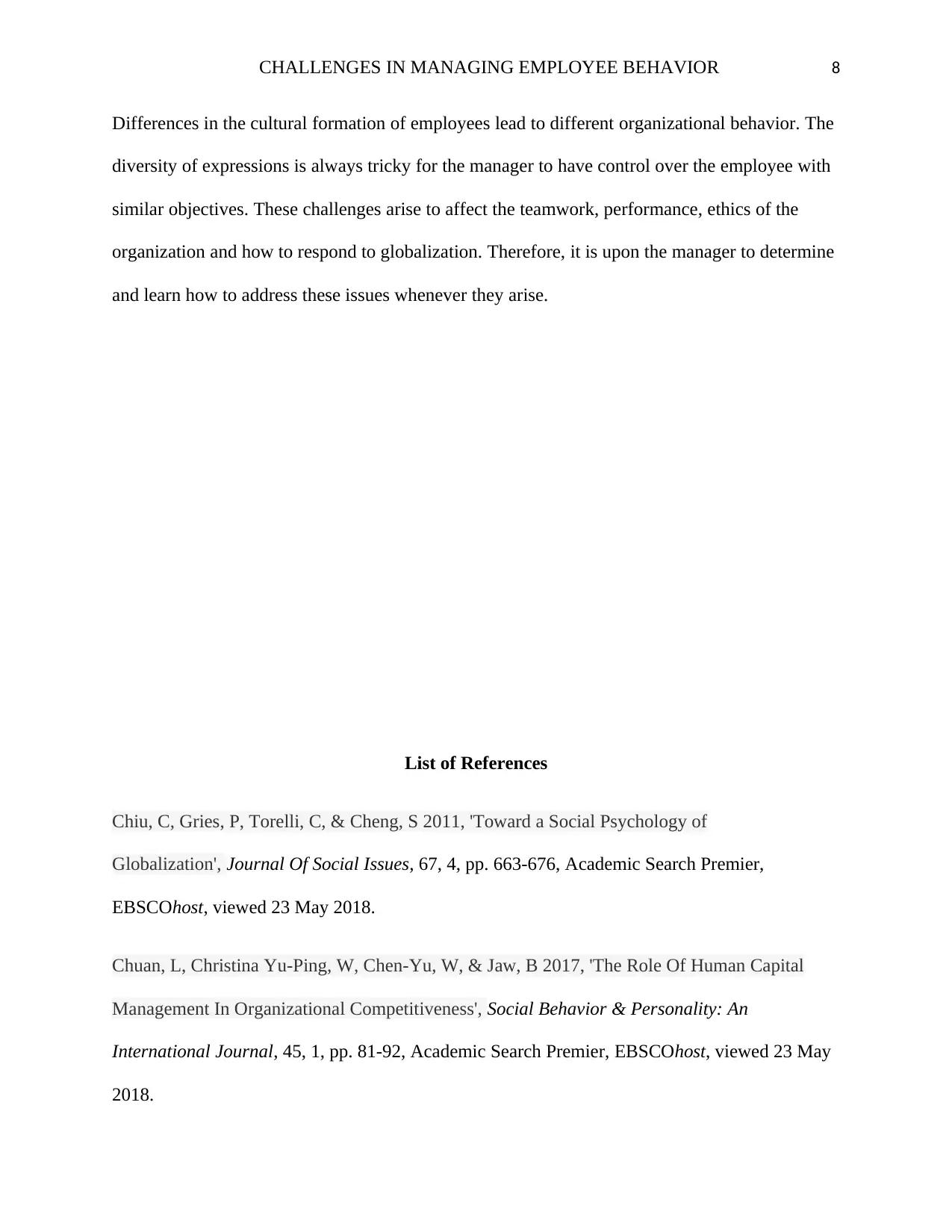
CHALLENGES IN MANAGING EMPLOYEE BEHAVIOR 8
Differences in the cultural formation of employees lead to different organizational behavior. The
diversity of expressions is always tricky for the manager to have control over the employee with
similar objectives. These challenges arise to affect the teamwork, performance, ethics of the
organization and how to respond to globalization. Therefore, it is upon the manager to determine
and learn how to address these issues whenever they arise.
List of References
Chiu, C, Gries, P, Torelli, C, & Cheng, S 2011, 'Toward a Social Psychology of
Globalization', Journal Of Social Issues, 67, 4, pp. 663-676, Academic Search Premier,
EBSCOhost, viewed 23 May 2018.
Chuan, L, Christina Yu-Ping, W, Chen-Yu, W, & Jaw, B 2017, 'The Role Of Human Capital
Management In Organizational Competitiveness', Social Behavior & Personality: An
International Journal, 45, 1, pp. 81-92, Academic Search Premier, EBSCOhost, viewed 23 May
2018.
Differences in the cultural formation of employees lead to different organizational behavior. The
diversity of expressions is always tricky for the manager to have control over the employee with
similar objectives. These challenges arise to affect the teamwork, performance, ethics of the
organization and how to respond to globalization. Therefore, it is upon the manager to determine
and learn how to address these issues whenever they arise.
List of References
Chiu, C, Gries, P, Torelli, C, & Cheng, S 2011, 'Toward a Social Psychology of
Globalization', Journal Of Social Issues, 67, 4, pp. 663-676, Academic Search Premier,
EBSCOhost, viewed 23 May 2018.
Chuan, L, Christina Yu-Ping, W, Chen-Yu, W, & Jaw, B 2017, 'The Role Of Human Capital
Management In Organizational Competitiveness', Social Behavior & Personality: An
International Journal, 45, 1, pp. 81-92, Academic Search Premier, EBSCOhost, viewed 23 May
2018.
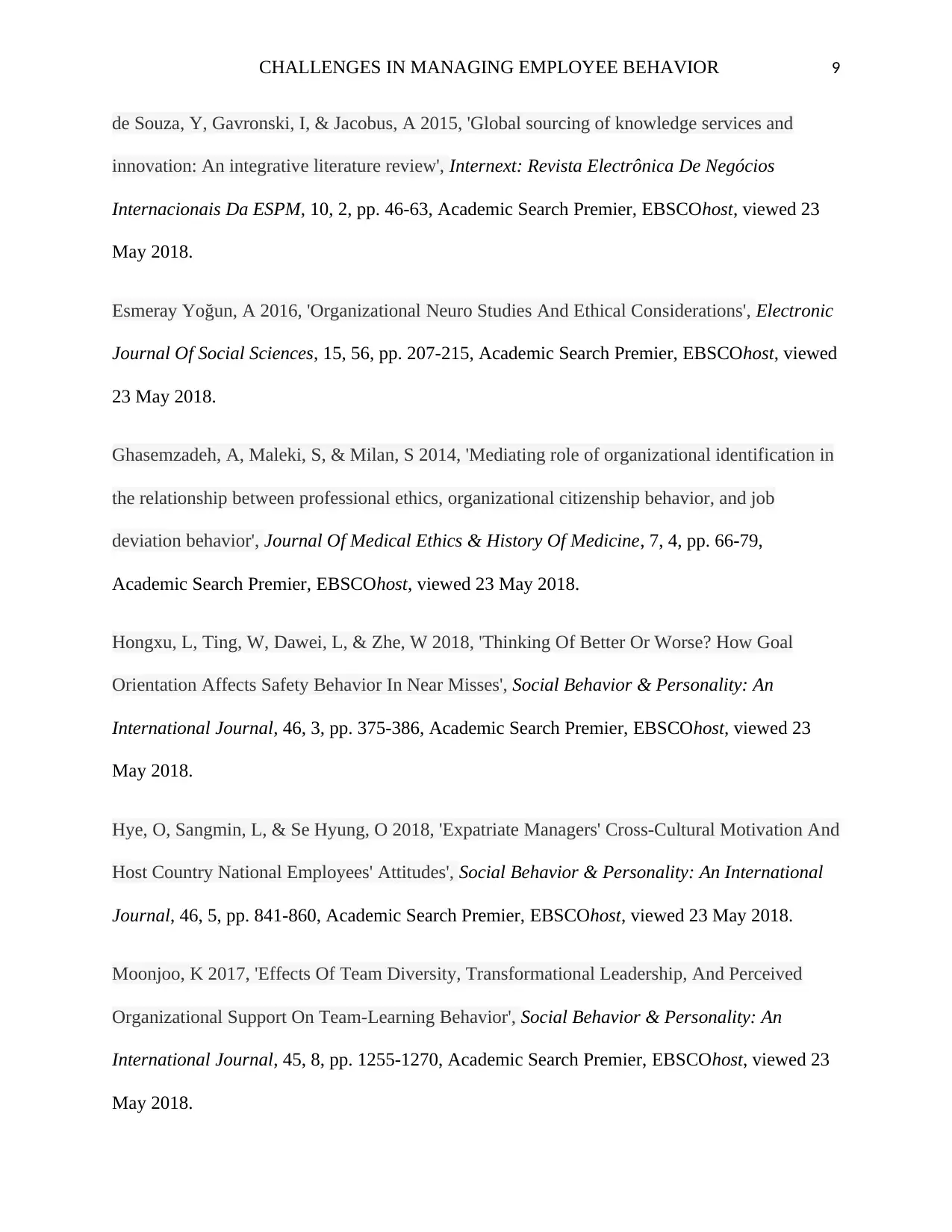
CHALLENGES IN MANAGING EMPLOYEE BEHAVIOR 9
de Souza, Y, Gavronski, I, & Jacobus, A 2015, 'Global sourcing of knowledge services and
innovation: An integrative literature review', Internext: Revista Electrônica De Negócios
Internacionais Da ESPM, 10, 2, pp. 46-63, Academic Search Premier, EBSCOhost, viewed 23
May 2018.
Esmeray Yoğun, A 2016, 'Organizational Neuro Studies And Ethical Considerations', Electronic
Journal Of Social Sciences, 15, 56, pp. 207-215, Academic Search Premier, EBSCOhost, viewed
23 May 2018.
Ghasemzadeh, A, Maleki, S, & Milan, S 2014, 'Mediating role of organizational identification in
the relationship between professional ethics, organizational citizenship behavior, and job
deviation behavior', Journal Of Medical Ethics & History Of Medicine, 7, 4, pp. 66-79,
Academic Search Premier, EBSCOhost, viewed 23 May 2018.
Hongxu, L, Ting, W, Dawei, L, & Zhe, W 2018, 'Thinking Of Better Or Worse? How Goal
Orientation Affects Safety Behavior In Near Misses', Social Behavior & Personality: An
International Journal, 46, 3, pp. 375-386, Academic Search Premier, EBSCOhost, viewed 23
May 2018.
Hye, O, Sangmin, L, & Se Hyung, O 2018, 'Expatriate Managers' Cross-Cultural Motivation And
Host Country National Employees' Attitudes', Social Behavior & Personality: An International
Journal, 46, 5, pp. 841-860, Academic Search Premier, EBSCOhost, viewed 23 May 2018.
Moonjoo, K 2017, 'Effects Of Team Diversity, Transformational Leadership, And Perceived
Organizational Support On Team-Learning Behavior', Social Behavior & Personality: An
International Journal, 45, 8, pp. 1255-1270, Academic Search Premier, EBSCOhost, viewed 23
May 2018.
de Souza, Y, Gavronski, I, & Jacobus, A 2015, 'Global sourcing of knowledge services and
innovation: An integrative literature review', Internext: Revista Electrônica De Negócios
Internacionais Da ESPM, 10, 2, pp. 46-63, Academic Search Premier, EBSCOhost, viewed 23
May 2018.
Esmeray Yoğun, A 2016, 'Organizational Neuro Studies And Ethical Considerations', Electronic
Journal Of Social Sciences, 15, 56, pp. 207-215, Academic Search Premier, EBSCOhost, viewed
23 May 2018.
Ghasemzadeh, A, Maleki, S, & Milan, S 2014, 'Mediating role of organizational identification in
the relationship between professional ethics, organizational citizenship behavior, and job
deviation behavior', Journal Of Medical Ethics & History Of Medicine, 7, 4, pp. 66-79,
Academic Search Premier, EBSCOhost, viewed 23 May 2018.
Hongxu, L, Ting, W, Dawei, L, & Zhe, W 2018, 'Thinking Of Better Or Worse? How Goal
Orientation Affects Safety Behavior In Near Misses', Social Behavior & Personality: An
International Journal, 46, 3, pp. 375-386, Academic Search Premier, EBSCOhost, viewed 23
May 2018.
Hye, O, Sangmin, L, & Se Hyung, O 2018, 'Expatriate Managers' Cross-Cultural Motivation And
Host Country National Employees' Attitudes', Social Behavior & Personality: An International
Journal, 46, 5, pp. 841-860, Academic Search Premier, EBSCOhost, viewed 23 May 2018.
Moonjoo, K 2017, 'Effects Of Team Diversity, Transformational Leadership, And Perceived
Organizational Support On Team-Learning Behavior', Social Behavior & Personality: An
International Journal, 45, 8, pp. 1255-1270, Academic Search Premier, EBSCOhost, viewed 23
May 2018.
⊘ This is a preview!⊘
Do you want full access?
Subscribe today to unlock all pages.

Trusted by 1+ million students worldwide
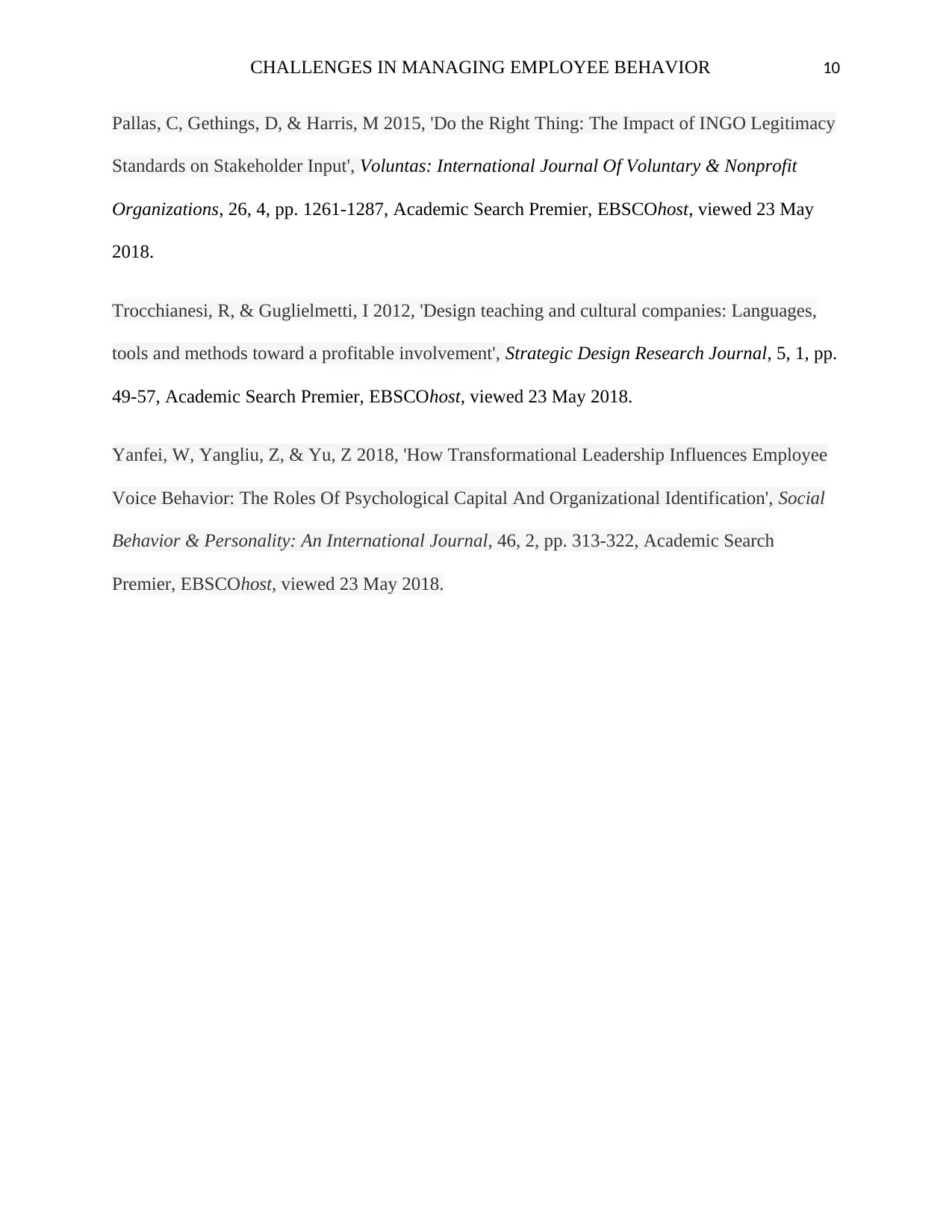
CHALLENGES IN MANAGING EMPLOYEE BEHAVIOR 10
Pallas, C, Gethings, D, & Harris, M 2015, 'Do the Right Thing: The Impact of INGO Legitimacy
Standards on Stakeholder Input', Voluntas: International Journal Of Voluntary & Nonprofit
Organizations, 26, 4, pp. 1261-1287, Academic Search Premier, EBSCOhost, viewed 23 May
2018.
Trocchianesi, R, & Guglielmetti, I 2012, 'Design teaching and cultural companies: Languages,
tools and methods toward a profitable involvement', Strategic Design Research Journal, 5, 1, pp.
49-57, Academic Search Premier, EBSCOhost, viewed 23 May 2018.
Yanfei, W, Yangliu, Z, & Yu, Z 2018, 'How Transformational Leadership Influences Employee
Voice Behavior: The Roles Of Psychological Capital And Organizational Identification', Social
Behavior & Personality: An International Journal, 46, 2, pp. 313-322, Academic Search
Premier, EBSCOhost, viewed 23 May 2018.
Pallas, C, Gethings, D, & Harris, M 2015, 'Do the Right Thing: The Impact of INGO Legitimacy
Standards on Stakeholder Input', Voluntas: International Journal Of Voluntary & Nonprofit
Organizations, 26, 4, pp. 1261-1287, Academic Search Premier, EBSCOhost, viewed 23 May
2018.
Trocchianesi, R, & Guglielmetti, I 2012, 'Design teaching and cultural companies: Languages,
tools and methods toward a profitable involvement', Strategic Design Research Journal, 5, 1, pp.
49-57, Academic Search Premier, EBSCOhost, viewed 23 May 2018.
Yanfei, W, Yangliu, Z, & Yu, Z 2018, 'How Transformational Leadership Influences Employee
Voice Behavior: The Roles Of Psychological Capital And Organizational Identification', Social
Behavior & Personality: An International Journal, 46, 2, pp. 313-322, Academic Search
Premier, EBSCOhost, viewed 23 May 2018.
1 out of 10
Related Documents
Your All-in-One AI-Powered Toolkit for Academic Success.
+13062052269
info@desklib.com
Available 24*7 on WhatsApp / Email
![[object Object]](/_next/static/media/star-bottom.7253800d.svg)
Unlock your academic potential
Copyright © 2020–2026 A2Z Services. All Rights Reserved. Developed and managed by ZUCOL.





